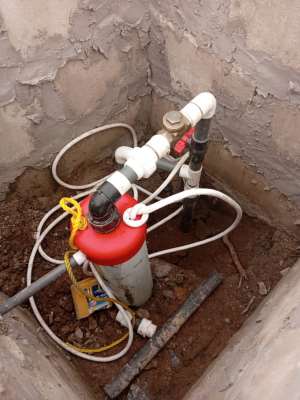
Access to clean water is no longer a distant dream but a growing reality at Bonsu, a farming community in the Nkoranza South Municipality of the Bono East region, thanks to a community-led initiative through the Facilitated Collective Action Process (FCAP).
For years, residents of Bonsu, especially those living in the newly developed areas, have had to commute long distances in search of water from either a nearby stream or from a few individuals with mechanized boreholes in their homes daily. These residents, especially women and children would typically load a bicycle with jerrycans, push them for long distances, thereby negatively impacting their health.
To address this challenge, the people of Bonsu began working collectively to extend pipe-borne water directly to various homes in October 2024.
This bold step toward improving public health and daily living conditions was made possible with a GHS 120,000.00 microgrant from Advocates for Community Alternatives (ACA).
So far, the impact has been quite remarkable as 75 out of about 307 households have been connected to the water system while most of the remaining households are in the process of getting connected. The community envisages at least 87 households, representing 40% of the households would have access to pipe-borne water in one year’s time.
This is expected to significantly reduce the burden of walking long distances for water and ensuring a safer, more convenient water supply.
Sustainability
Beyond improving access to water, the project is also strengthening the community’s financial sustainability.
Any household that seeks to extend the water, contributes a token of GHS 200.00 to the Oman yie die Committee, creating a local fund that will be used to support other development priorities identified during the community’s visioning and goal-setting stage of the FCAP process.
Sharing his enthusiasm about the project’s long-term impact, Mr. Ameyaw Franklin, Technical Advisor from the Nkoranza South Municipal Assembly, said: “I’m excited about the fact that water will not be wasted but rather stored and used efficiently to benefit residents. Even more importantly, the small contributions from households will help generate income that the community can reinvest in future development initiatives.”
Ms. Juliet Fosuaa, the Community-Based Facilitator, also reflected on the journey with pride saying: “I’m really excited about the knowledge ACA equipped me with through the FCAP methodology. It gave me the skills to guide my community in developing a shared vision, and today, that vision is becoming a reality through this successful water extension project.”
Community-led
The Bonsu water extension project stands as a compelling example of community-led development in action, where local voices, local leadership, and shared responsibility come together to create lasting change.
Advocates for Community Alternatives, an NGO operating in Ghana using the FCAP methodology, is extremely excited to watch communities own their development trajectory, hoping that government and other social actors will be interested in adopting this strategy towards community planning and development.


